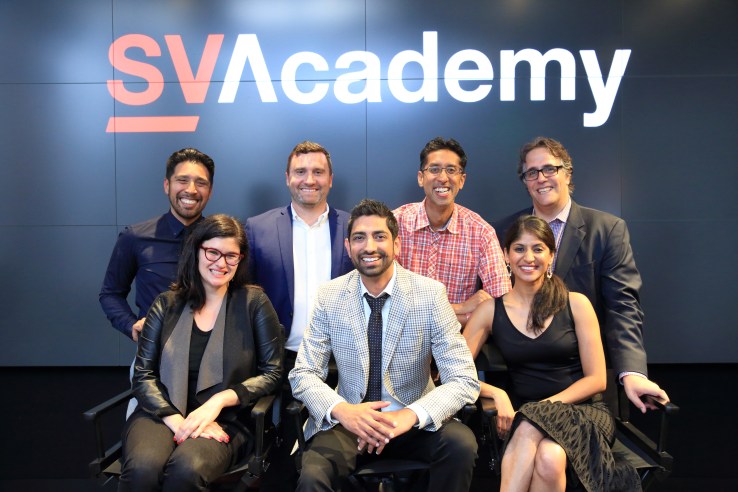This ambitious founder wants to find high-paying biz dev jobs for one million Americans

Rahim Fazal grew up in government housing. He worked, as do many students, at McDonald’s during high school. He didn’t go to college.
These aren’t the kinds of details that might excite a recruiter at a big tech company, yet Fazal has done just fine, including co-founding a company a decade ago that sold to Oracle, where he spent the next two and a half years; becoming an advisor at CodeNow, which works with underrepresented youth to teach foundational computer programming; and, more recently, co-founding SVAcademy in San Francisco. What it does: find people like Fazal himself who are under-resourced but have no shortage of grit, and train them how to work in a professional tech setting. It’s getting them jobs, too, including at places like Salesforce, Box and Zuora.
Fazal, who cofounded SVAcademy with Joel Scott, an operator who spent the last decade with HP, leaving as VP of operations at Hewlett Packard Enterprise, is taking the wraps off the company today. He’s also disclosing that SVAcademy recently raised $2 million in funding from Bloomberg Beta, Rethink Education, Precursor Ventures, Uprising Ventures, 500 Startups and WTI, along with numerous angel investors. We talked with him yesterday to better understand how the outfit is working with employers to get nontraditional candidates into their workforces — and why they want to.
TC: You say you want to give a million women, minorities and under-resourced Americans high-paying jobs in sales or business development.
RF: Yes, the types of students we’re looking for are incredibly diverse. So far, 60 percent of the roughly 1,000 people who’ve been qualified for the program have been first-generation college students, 50 percent have been women and one-third have been African-American or Latino.
TC: What does your platform, or your programming, involve?
RF: It’s entirely virtual. We want to provide access to students wherever they might be while also exporting Silicon Valley mentorship and experience throughout the country. It’s 15 months long. Once you get into the program, you spend the first three months working on the skills needed in the field. That’s 250 hours spent with your class and a teacher and a mentor, learning the technical skills and social and emotional skills you need to perform business development and sales at a SaaS company. If you pass, you get connected with a growing number of employers who are partnering with us, then we continue to coach and mentor you and help you close your skill gap for the first 12 months on the job.
TC: Who pays for this programming?
RF: Employers are paying us to provide [this service] because we can qualify and pre-train students so they can can on-ramp faster and become productive faster, which CEOs care greatly about. We’re lowering [the companies’] churn in these positions, because people are well-prepared and very much want the roles that they are landing. And third, employers care deeply about diversity.
TC: How are you identifying who to invite or accept into this training program?
RF: We’ve been going to college campuses and speaking, particularly campuses where we think we can find students who might otherwise be overlooked. Frankly, the majority of Americans fit into the populations that we come from and care about. Our first batch of 10 students now in the workforce all went to public schools, all worked in retail or other jobs to put themselves through college and are all now working for companies in entry-level jobs that pay between $70,000 and $90,000.
We’re also looking for how people are performing, what decisions they’ve made relative to other students who grew up under similar constraints . . . we’re helped by a proprietary algorithm that [should get smarter over time with more input].
TC: Does someone need an undergraduate degree?
RF: No. You don’t have to have a college degree, and there are no requirements that you have to come from this school or have that GPA. Our success is driven by outcomes. What we’re working hard to do is get employers to be more open-minded about hiring students who look very different [than their traditional candidates]. We don’t want them looking for the same old signals.
Employers still struggle with elitism in recruiting systems, and there’s a big opportunity for us to break through that elitism by finding nontraditional candidates who may not have gone to top schools or who have the characteristics of early success, including grit.
TC: There’s a lot of attrition when it comes to online learning. How many students get through that initial 250 hours of training?
RF: 1,000 students have been qualified, and we’ve so far taken 5 percent of them [or 50].
You know about halfway through the program whether it’s the right fit. At that point, the student usually knows if it’s not working for them, despite our support. That’s the hard work we do on behalf of employers; we find people who can’t just do the job but who are committed to doing it.
TC: Who is doing the mentoring, by the way?
RF: We have executives from Oracle, Google, LinkedIn, Salesforce.
TC: Why are they helping you? Are these investors in SVAcademy?
RF: In a couple of cases, people are investors, but certainly not all of them are. We have five mentors from Google who aren’t even in my network, for example. They’re doing it because the quality of the students is high. I think the mentors also really enjoy helping the next generation and working with people who are just starting their careers. Our mentors are coming from diverse populations, too, and they’ve experienced elitism and remember being a young adult who’s just to figure his or her way out.
TC: And if they find people to hire for their teams . . .
RF: That’s definitely another benefit.
Pictured above: co-founder and CEO Rahim Fazal, center, with SVAcademy’s founding team.